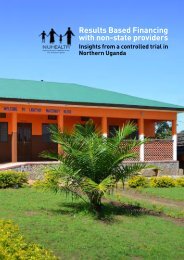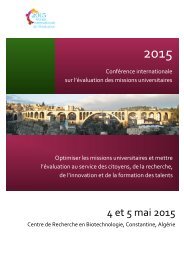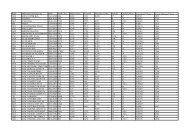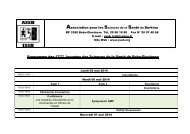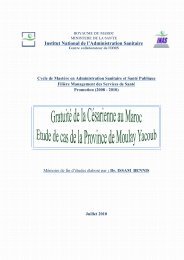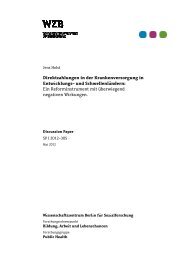Bellagio-Report-Vs-Apr-14
Bellagio-Report-Vs-Apr-14
Bellagio-Report-Vs-Apr-14
You also want an ePaper? Increase the reach of your titles
YUMPU automatically turns print PDFs into web optimized ePapers that Google loves.
efforts to address some of the most seriouschallenges faced by the continent. Africa’seconomic and societal progress and of itsecosystems remains under threat from thepressures noted above, while the sustainabilityof development efforts and the resilience of itspeople and their systems are encouraging butcertainly not assured. Evaluators have to beclear – and refrain from being naïve – aboutthose broader contexts, norms and values thatframe development efforts. They should also beclear about the norms and values that they holdin their evaluation work. They need to questionmore frequently not only whether anintervention reaches its goals, but the goalsthemselves - given the context in which theyhave been identified.This! means! that! evaluators! in! their! practice!need!to!i. consider during evaluations thediversity of the stakeholders as well ascontexts, thus ensuring thatdevelopment is not seen as being onlyabout average effects on a populationii. be cognizant of the macro, evolvingpolitical and economic contexts withinwhich interventions – and theirevaluations - are planned andexecuted,iii. be explicit about the norms and valuesthat drive particular interventions, andtheir evaluations, andiv. ensure that the approaches andmethodologies exist to evaluate (within)the complexity of such situations, andof efforts to find “big solutions” toregional challenges.Vulnerability and resilienceSocieties are increasingly vulnerable in aninterdependent, connected and competitiveworld. Changes in one country, whetherpolitical, economic, financial, social, in healthstatus or in the environment, can affect regions,or the whole world. Shocks, both natural andman-made, appear to be more frequent or moresignificant, with climate change increasingly atthe forefront. Value systems are shaken byexposure to foreign cultures, and groups judged‘inferior’ by others tend to lose their confidenceand self-esteem when they acknowledge thatclassification. As inequality grows across partsof the world, and differences are exploitedalong ethnic and religious lines, fragmentationand conflicts increase. Many fragile nationsremain in a state of extreme poverty,disempowerment or perpetual conflict, whileunbridled corruption across the world, at macroand micro levels, further weakens institutions.Countering vulnerability, and enhancing theresilience of individuals, communities, societalsystems and nations are increasingly part of thedevelopment narrative. This requires that theAfrican evaluation community become moreexpert ini. cultivating a culture of evaluativethinking, and of evaluation-drivenaction in societyii.iii.iv.better understanding the concepts of‘sustainability’ and ‘resilience’, andhow to evaluate for itengaging with the unintendedconsequences of development effortsavoiding the mindless and/or contextdivorcedapplication of critical notionssuch “democracy”, “human rights” and“equity”, andv. evaluating critical aspects related tovulnerability and its mitigation, such asthe role of power in development andin evaluation; of ‘empowerment’ effortsgiven on-going vulnerabilities; theeffects of macro issues such as climatechange, increasing instability as a resultof joblessness, multi-faceted, multidirectionalcorruption; and thedevelopment of governance andinstitutional systems.!New sources and instruments for aid anddevelopment financeThe financial crisis has resulting in shifts indevelopment finance that are likely to be feltonly over the next decade. The most visibleinternational source of development fundinghas been the development aid (now called‘international development cooperation’)provided by the group of OECD countries.While the aid streams will continue, in part dueto the important contribution of aid to ‘softpower’, they are likely to become increasinglymarginalized by other actors, financing sourcesand types of financing instruments.New actors include the BRICS and Gulf Stateswhich, as the recent engagements Accra andBusan showed, have diverse and nonconventionalapproaches to developmentcooperation and finance. Coupled to the factthat the power over poor countries of the global9



